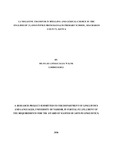| dc.description.abstract | This study investigated first language negative transfer in spelling and lexical choice in the
English of class eight pupils from Kanaani Primary School in Machakos County. It was done to
identify the spelling and lexical errors, to establish the extent the spelling errors can be attributed
to the influence of Kikamba Phonology and lastly to establish the extent to which the lexical
errors can be attributed to the influence of the Kikamba vocabulary. Data was collected from a
sample of Sixty nine class eight pupils from Kanaani primary School. The procedure used to
collect the sample was by asking the pupils to write compositions. All the spelling errors and
lexical choice errors were identified from the compositions and listed down. The errors were
classified according to their sources. With regards to the first hypothesis, it was established that,
thirty one percent of the spelling errors are due to Prenasalisation, eleven percent were due to
consonant substitution, twenty five percent were due to vowel substitution, three percent were
due to vowel insertion, while orthographic transfer accounts for thirty percent of the total errors.
The findings confirmed the first hypothesis that the majority of the spelling errors are due to the
influence from Kikamba phonology. The majority of spelling errors in the compositions are
attributable to influence from Kikamba phonology. The findings of the study also confirm that
Kikamba vocabulary influences the lexical choice in learners’ compositions. The study research
hypotheses were: 1.The majority of spelling errors in the compositions are attributable to
influence from Kikamba Phonology and 2. The majority of lexical choice errors in compositions
are attributable to Kikamba vocabulary. The present findings of this study validate hypotheses
that most of the spelling errors are due to influence from Kikamba phonology and that most the
of lexical choice errors are due to influence from Kikamba vocabulary. The results supported the
hypothesis: with regard to the first hypothesis, the majority of the errors are due phonological
processes which are common in Kikamba language and with regard to the second hypothesis, all
the lexical errors in the learners compositions are due to direct translations and word transfer
which is as a result of negative transfer from the learners’ L1. | en_US |



